If you want to maintain optimal digestive health, understanding the regulation of pancreatic secretion is crucial. The pancreas plays a crucial role in digestion, producing enzymes that break down carbohydrates, proteins, and fats. However, the secretion of these enzymes must be regulated to ensure they are released in the right amounts at the right time.
So, what regulates pancreatic secretion of digestive enzymes? In this article, we will explore the various mechanisms that control pancreatic enzyme release and how they contribute to overall digestive function.
Key Takeaways:
- The pancreas produces digestive enzymes that break down carbohydrates, proteins, and fats.
- Regulating pancreatic enzyme secretion is important to ensure they are released in the right amounts at the right time.
- There are multiple mechanisms that control pancreatic enzyme release, including hormones and neural regulation.
The Role of Pancreatic Function in Digestion
If you want to understand how your body digests food, you need to know about the pancreas. This glandular organ is part of the digestive system and plays a key role in breaking down the food you eat. The pancreas produces a variety of digestive enzymes that help to digest carbohydrates, proteins, and fats so that your body can absorb the nutrients it needs.
When you eat, your body releases a hormone called cholecystokinin, which triggers the pancreas to secrete digestive enzymes into the small intestine. As food moves through your small intestine, these enzymes break down the complex molecules into simpler compounds that can be absorbed into your bloodstream.
The pancreas also produces bicarbonate, a base that neutralizes the acidic contents of your stomach as they enter your small intestine. This is important because the digestive enzymes produced by the pancreas work best in a slightly alkaline environment.
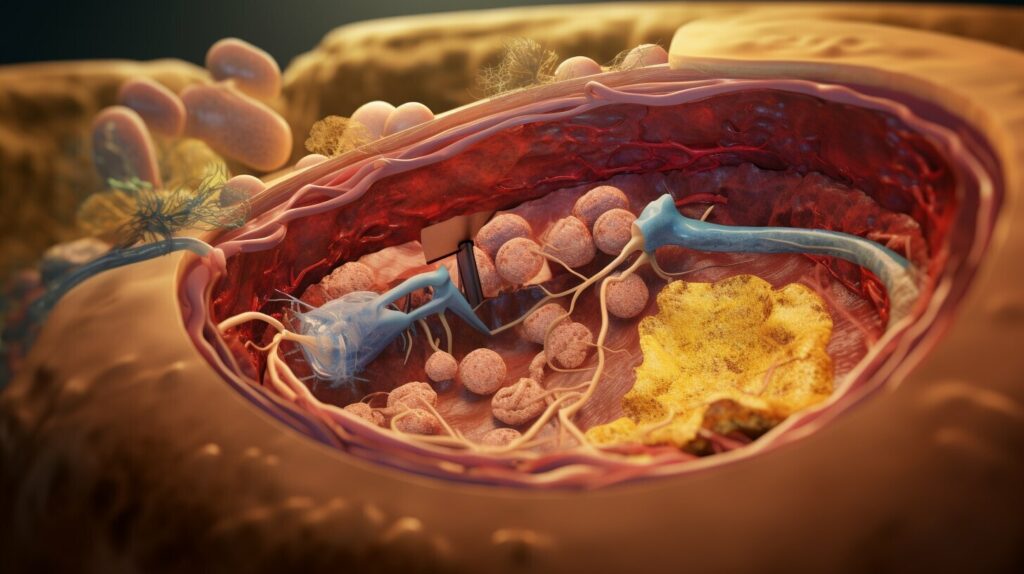
Without the pancreas and its enzymes, your body would not be able to absorb nutrients efficiently. In fact, pancreas dysfunction can lead to malnutrition, weight loss, and other serious health problems.
The Pancreatic Enzymes
The pancreas produces several different enzymes that are involved in the digestive process. These include:
| Enzyme | Substrate | Function |
|---|---|---|
| Amylase | Carbohydrates (starches) | Breaks down carbohydrates into simple sugars |
| Proteases | Proteins | Break down proteins into amino acids |
| Lipases | Fats (triglycerides) | Break down fats into fatty acids and glycerol |
These enzymes are produced by specialized cells called acinar cells, which make up the bulk of the pancreas. The acinar cells secrete the enzymes into small ducts that lead to the main pancreatic duct, which carries the enzymes to the small intestine.
In addition to these enzymes, the pancreas also produces other substances that are important for digestion, such as insulin and glucagon, which regulate blood sugar levels.
When everything is working properly, the pancreas produces just the right amount of enzymes and other substances to meet your body’s digestive needs. However, if something goes wrong with the pancreas, it can lead to serious health problems.
Pancreatic Acinar Cells and Enzyme Production
The pancreas is an essential organ in the digestive process, responsible for producing and secreting digestive enzymes into the small intestine. These enzymes are produced by specialized cells in the pancreas called acinar cells.
Within the pancreas, acinar cells form clusters called acini, which are the primary site of enzyme production. Enzymes, such as trypsin, chymotrypsin, and amylase, are produced in an inactive form known as zymogens, which prevents them from damaging the pancreas itself. Activation of these zymogens occurs in the small intestine when they come into contact with other enzymes.
The production and secretion of digestive enzymes by acinar cells are regulated by a variety of factors, including hormones and neuronal signaling. For example, the presence of food in the small intestine stimulates the release of hormones, such as cholecystokinin and secretin, which act on the pancreas to increase enzyme production and release. Additionally, neuronal signals from the vagus nerve can stimulate pancreatic enzyme secretion.
Overall, the regulation of pancreatic enzyme production and secretion is a complex process involving multiple factors and systems. Understanding the mechanisms involved is essential for optimizing digestive health.
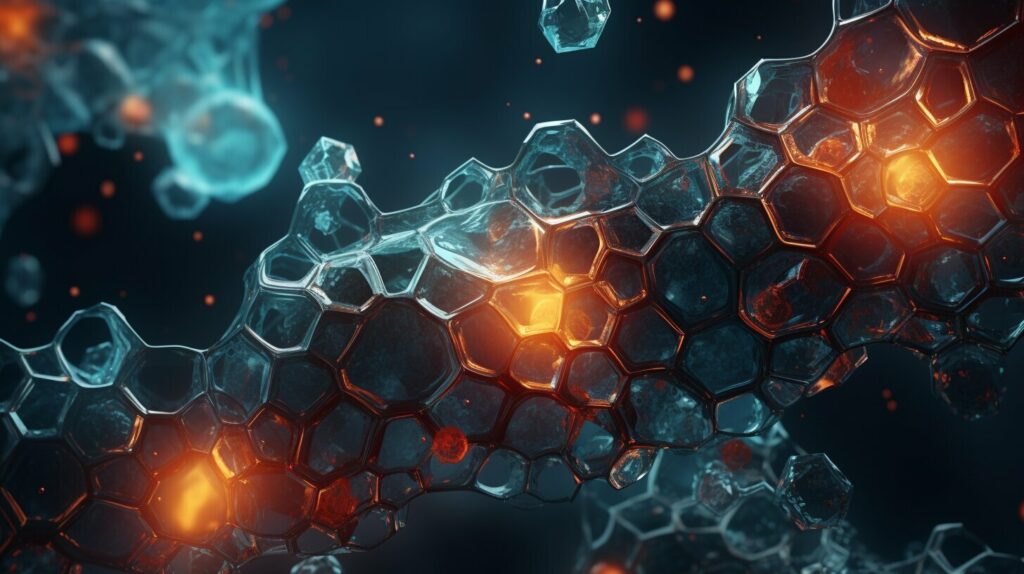
Regulation of Pancreatic Enzyme Release
Understanding the mechanisms that regulate the release of pancreatic enzymes into the digestive system is important for maintaining optimal digestive function. The release of pancreatic enzymes is regulated by a complex interplay of hormonal and neural signals.
Factors Influencing Pancreatic Enzyme Secretion
The release of pancreatic enzymes is influenced by several factors, including the presence of food in the stomach and duodenum. The hormone cholecystokinin (CCK) is released in response to the presence of food in the duodenum, which signals the pancreas to release digestive enzymes. Secretin, another hormone, is released in response to the acidic chyme entering the duodenum, and it stimulates the release of bicarbonate-rich pancreatic juice to neutralize the acidity.
Vagus Nerve and Neural Regulation
The nervous system also plays a role in regulating pancreatic enzyme release. The vagus nerve, which is a major nerve that runs from the brainstem to the abdomen, stimulates the production and release of digestive enzymes. The vagus nerve is activated by the sight, smell, and taste of food, as well as by the presence of food in the stomach.
Feedback Mechanisms
Feedback mechanisms also play a role in regulating pancreatic enzyme secretion. When the small intestine detects the presence of partially digested food, it releases hormones that stimulate the pancreas to release more digestive enzymes. Conversely, when the small intestine does not detect the presence of food, it releases inhibitory hormones that reduce pancreatic enzyme secretion.

Importance of Regulation
Overall, the regulation of pancreatic enzyme release is a complex process that involves multiple factors. Understanding the regulation of pancreatic secretion is important for maintaining optimal digestive function and preventing digestive disorders.
The Role of Hormones in Pancreatic Secretion
Now that we’ve discussed the neural regulation of pancreatic secretion, let’s look at the role of hormones in this process. Hormones such as cholecystokinin (CCK) and secretin play a significant role in regulating pancreatic secretion and enzyme production.
CCK is released by cells in the small intestine in response to the presence of fatty acids and amino acids in the chyme (partially digested food). It stimulates the secretion of pancreatic enzymes such as lipase, amylase, and proteases, which are necessary for the digestion of fats, carbohydrates, and proteins, respectively. CCK also causes the contraction of the gallbladder, leading to the release of bile into the small intestine to aid in fat digestion.
Secretin, on the other hand, is released by cells in the duodenum in response to the acidic chyme. It stimulates the secretion of bicarbonate ions by the pancreas, which neutralizes the acidic chyme as it enters the small intestine. This helps protect the intestinal walls from damage due to the acidic environment and also promotes the activity of pancreatic enzymes.
The regulation of pancreatic juice secretion by these hormones is a complex process that involves multiple feedback mechanisms. The hormones work together to ensure that pancreatic secretion is synchronized with the digestive needs of the small intestine.
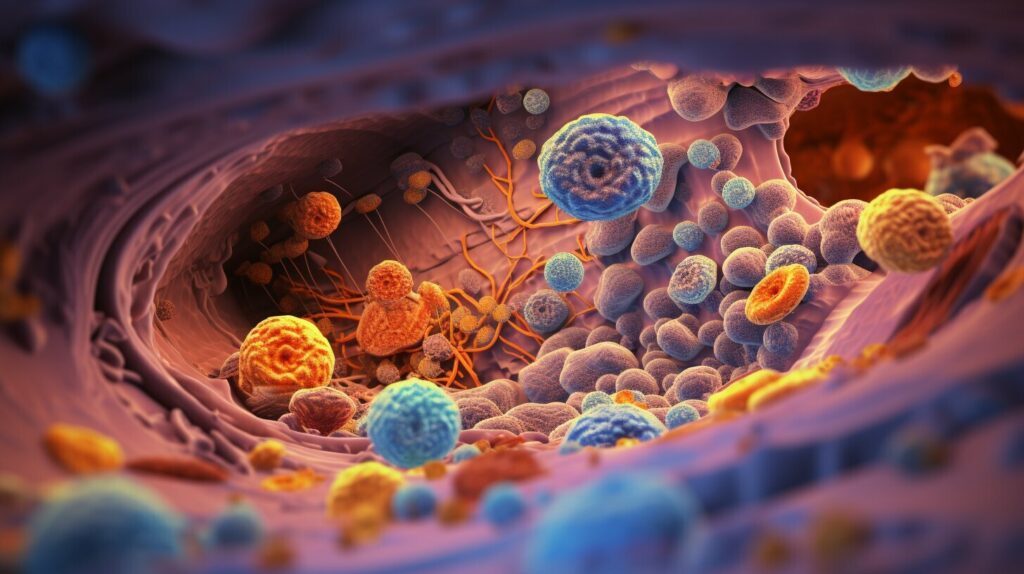
Overall, the hormonal regulation of pancreatic secretion is crucial for optimal digestion and absorption of nutrients from food. Without the proper secretion of enzymes and other pancreatic juices, digestion would be incomplete, leading to various digestive problems like malabsorption, diarrhea, and abdominal discomfort.
Neural Regulation of Pancreatic Secretion
The nervous system also plays a crucial role in regulating pancreatic secretion and enzyme release. Specifically, the vagus nerve, which is part of the parasympathetic nervous system, stimulates pancreatic secretion in response to the presence of food in the stomach.
When you start eating, your brain sends signals through the vagus nerve to the pancreas, triggering the release of digestive enzymes into the small intestine. This neural regulation helps ensure that enzyme secretion is coordinated with the arrival of food in the digestive system.
In addition, the sympathetic nervous system also plays a role in pancreatic secretion. Under conditions of stress, the sympathetic nervous system inhibits pancreatic secretion, redirecting blood flow to other organs that are more immediately necessary for survival.
Overall, the neural regulation of pancreatic secretion is an important mechanism that helps ensure efficient digestion and nutrient absorption.
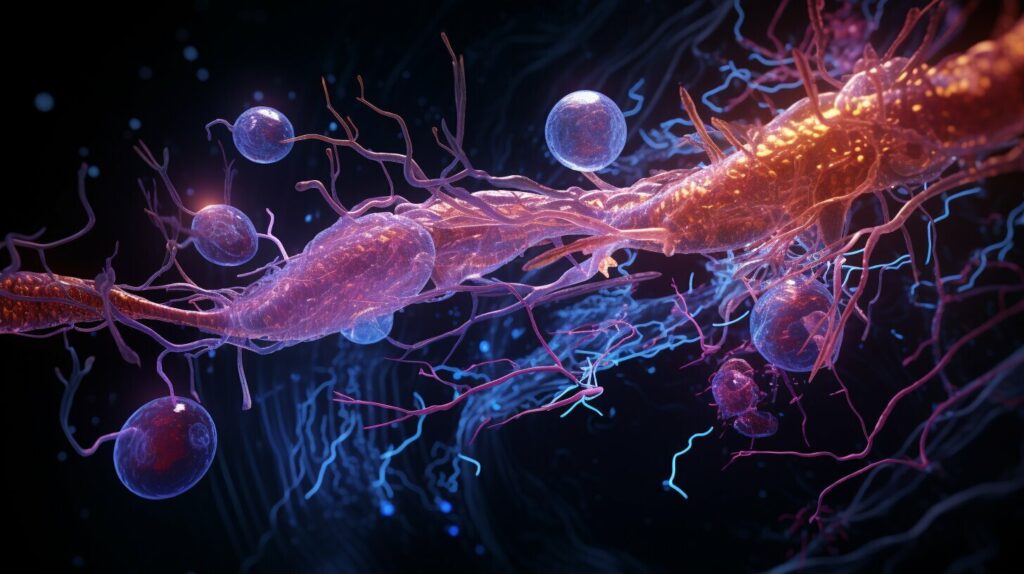
“When you start eating, your brain sends signals through the vagus nerve to the pancreas, triggering the release of digestive enzymes into the small intestine.”
Feedback Mechanisms in Pancreatic Secretion
Several feedback mechanisms are in place to ensure optimal pancreatic secretion and enzyme production levels. These mechanisms work together to regulate the release of pancreatic enzymes into the digestive system and maintain appropriate levels in response to changes in the digestive system.
One such mechanism is the negative feedback loop. When the level of pancreatic enzymes in the digestive system rises, it inhibits the release of more enzymes, preventing an excessive amount of enzymes from being released. This mechanism helps maintain a steady, controlled flow of enzymes during digestion.
Another feedback mechanism is the positive feedback loop. When chyme, the partially digested food mixture, enters the duodenum, it stimulates the release of cholecystokinin and secretin, hormones that signal the pancreas to secrete more enzymes. This feedback loop ensures that enough enzymes are released to effectively break down food.
The nervous system also plays a role in feedback mechanisms. The vagus nerve, which connects the brain to the digestive system, responds to signals from the digestive system and sends feedback to the pancreas to adjust enzyme secretion levels accordingly.
Overall, these feedback mechanisms work together to maintain optimal pancreatic secretion and enzyme production levels, ensuring effective digestion and absorption of nutrients.

Disorders Affecting Pancreatic Enzyme Regulation
Several disorders can affect the regulation of pancreatic enzymes, which can lead to impaired digestion and malabsorption of nutrients. Two common disorders that affect pancreatic function are pancreatitis and cystic fibrosis.
| Disorder | Symptoms | Treatment |
|---|---|---|
| Pancreatitis | Abdominal pain, nausea, vomiting, diarrhea, fever, elevated heart rate, and dehydration. | Treatment involves resting the pancreas, pain management, and intravenous fluids to prevent dehydration. In severe cases, hospitalization may be necessary. |
| Cystic Fibrosis | Chronic respiratory infections, digestive problems, poor growth, fatty stools, and infertility in males. | Treatment aims to manage symptoms and prevent complications. This may include enzyme replacement therapy, antibiotics for respiratory infections, and surgery for intestinal obstruction. |
In both conditions, the production and release of pancreatic enzymes may be impaired, leading to malabsorption of nutrients and other complications. If left untreated, these disorders can have serious consequences on your overall health and quality of life.
It is crucial to consult with a healthcare professional if you experience any symptoms related to pancreatic function or digestion. Early detection and treatment can improve outcomes and prevent further damage to the pancreas.
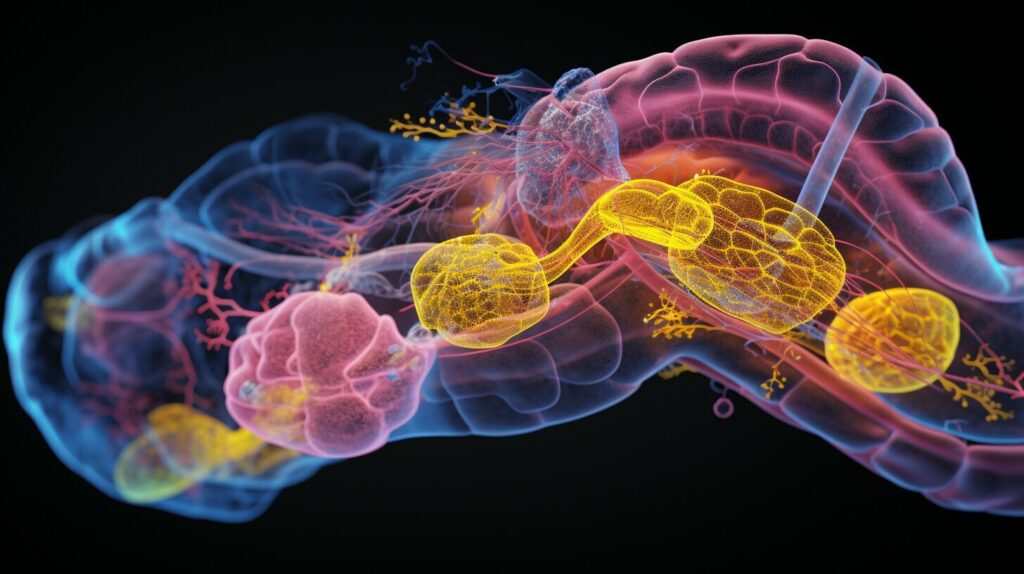
Therapeutic Approaches to Pancreatic Enzyme Regulation
If you have been diagnosed with a pancreatic disorder that affects enzyme regulation, there are several therapeutic approaches that can help improve your digestive function and overall health.
One common treatment option is enzyme replacement therapy, which involves taking capsules or tablets containing pancreatic enzymes with meals. This can help compensate for the lack of enzymes produced by the pancreas, allowing for better nutrient absorption and improved digestion.
In addition to enzyme replacement therapy, your healthcare provider may also recommend dietary changes to support optimal pancreatic function. This may include increasing your intake of foods that are rich in pancreatic enzymes, such as papaya, pineapple, and fermented vegetables.
It is also important to avoid foods that can trigger inflammation in the pancreas, such as processed and high-fat foods, as well as alcohol and tobacco. Maintaining a healthy weight, staying hydrated, and managing stress can also help support pancreatic function.
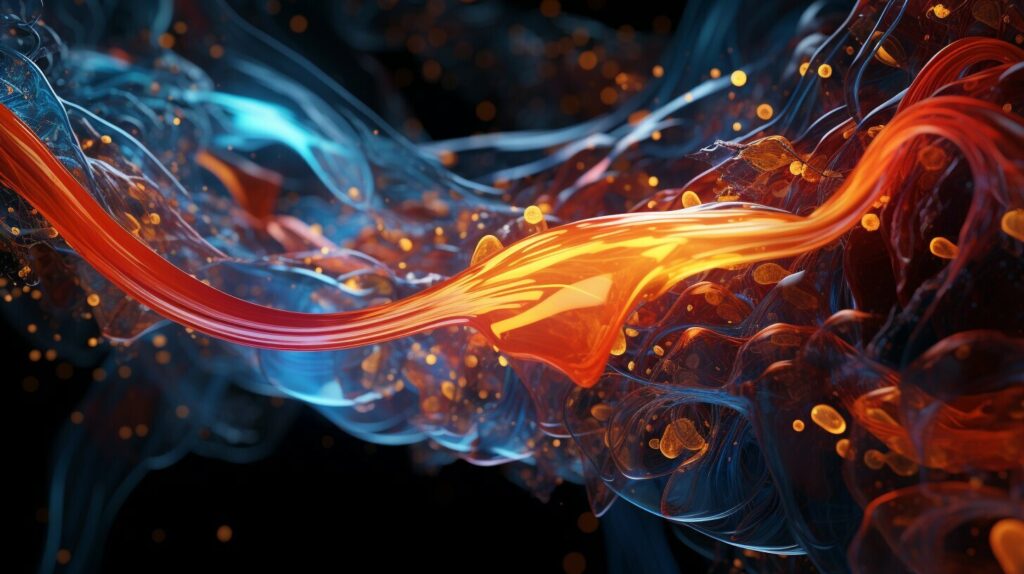
If you have a severe pancreatic disorder that requires more aggressive treatment, you may need to undergo surgery to remove damaged tissue or blockages that are impacting pancreatic function. Your healthcare provider can help determine the best course of treatment based on your individual needs and symptoms.
By working closely with your healthcare provider and following a personalized treatment plan, you can help manage your pancreatic disorder and improve your digestive function, allowing for better overall health and wellbeing.
Conclusion
In conclusion, understanding the regulation of pancreatic secretion of digestive enzymes is essential for optimal digestion and overall health. The pancreas plays a vital role in the digestive process by producing enzymes that break down food in the small intestine. Pancreatic acinar cells are responsible for producing digestive enzymes, and their production is regulated by both hormones and neural signals.
The release of pancreatic enzymes is also regulated by feedback mechanisms that help maintain optimal levels in response to changes in the digestive system. However, disorders such as pancreatitis and cystic fibrosis can disrupt pancreatic enzyme regulation and impact digestion.
Fortunately, there are therapeutic approaches available, such as enzyme replacement therapy, which can help regulate pancreatic enzyme secretion in individuals with pancreatic disorders.
In summary, a healthy functioning pancreas and optimal pancreatic enzyme regulation are crucial for efficient digestion and overall health. By understanding the regulation of pancreatic secretion, you can make informed decisions about your diet and lifestyle to support optimal digestive function and well-being.
FAQ
Q: What regulates pancreatic secretion of digestive enzymes?
A: Pancreatic secretion of digestive enzymes is regulated by various mechanisms, including hormonal and neural factors. Hormones such as cholecystokinin and secretin play a crucial role in stimulating the pancreas to produce and release enzymes. Additionally, the nervous system, particularly the vagus nerve, also plays a role in regulating pancreatic secretion.
Q: What is the role of pancreatic function in digestion?
A: The pancreas plays a crucial role in digestion by producing and releasing enzymes that break down food. These pancreatic enzymes, including amylase, lipase, and proteases, help to break down carbohydrates, fats, and proteins, respectively, into smaller molecules that can be absorbed by the body.
Q: How do pancreatic acinar cells contribute to enzyme production?
A: Pancreatic acinar cells are responsible for producing and secreting digestive enzymes. These cells synthesize enzymes such as amylase, lipase, and proteases, which are then transported to the pancreatic ducts for release into the digestive system.
Q: How is the release of pancreatic enzymes regulated?
A: The release of pancreatic enzymes is regulated by various mechanisms. Hormones, such as cholecystokinin and secretin, stimulate the pancreas to release enzymes in response to the presence of food in the digestive system. Neural signals from the vagus nerve also play a role in regulating enzyme release.
Q: What is the role of hormones in pancreatic secretion?
A: Hormones such as cholecystokinin and secretin play a crucial role in regulating pancreatic secretion. Cholecystokinin is released in response to the presence of food in the small intestine and stimulates the pancreas to release enzymes. Secretin, on the other hand, is released when the acidity of the duodenum increases and stimulates the pancreas to release bicarbonate-rich pancreatic juice to neutralize the acid.
Q: How does neural regulation impact pancreatic secretion?
A: Neural regulation, particularly through the vagus nerve, plays a role in regulating pancreatic secretion. Nerve impulses from the vagus nerve stimulate the release of pancreatic enzymes in response to the presence of food in the digestive system. This neural control helps coordinate the timing of enzyme release with the arrival of food in the small intestine.
Q: What are the feedback mechanisms involved in pancreatic secretion?
A: Feedback mechanisms play a crucial role in maintaining optimal pancreatic secretion levels. These mechanisms involve sensing changes in the digestive system, such as changes in acidity or the presence of nutrients, and adjusting pancreatic secretion accordingly. This feedback helps ensure the efficient digestion of food.
Q: What disorders can affect pancreatic enzyme regulation?
A: Several disorders can affect pancreatic enzyme regulation, including pancreatitis and cystic fibrosis. Pancreatitis, inflammation of the pancreas, can disrupt enzyme production and secretion. Cystic fibrosis, a genetic disorder, can lead to thickened pancreatic secretions, impairing enzyme release and digestion.
Q: What therapeutic approaches are used to regulate pancreatic enzyme secretion?
A: Therapeutic approaches, such as enzyme replacement therapy, are used to regulate pancreatic enzyme secretion in individuals with pancreatic disorders. Enzyme replacement therapy involves taking oral pancreatic enzyme supplements to compensate for insufficient enzyme production and aid digestion.
Q: What is the importance of understanding pancreatic enzyme regulation?
A: Understanding the regulation of pancreatic enzyme secretion is crucial for optimal digestion and overall health. Proper enzyme secretion ensures the efficient breakdown and absorption of nutrients from food. Disorders affecting pancreatic enzyme regulation can lead to malabsorption and nutrient deficiencies, highlighting the importance of this topic.














